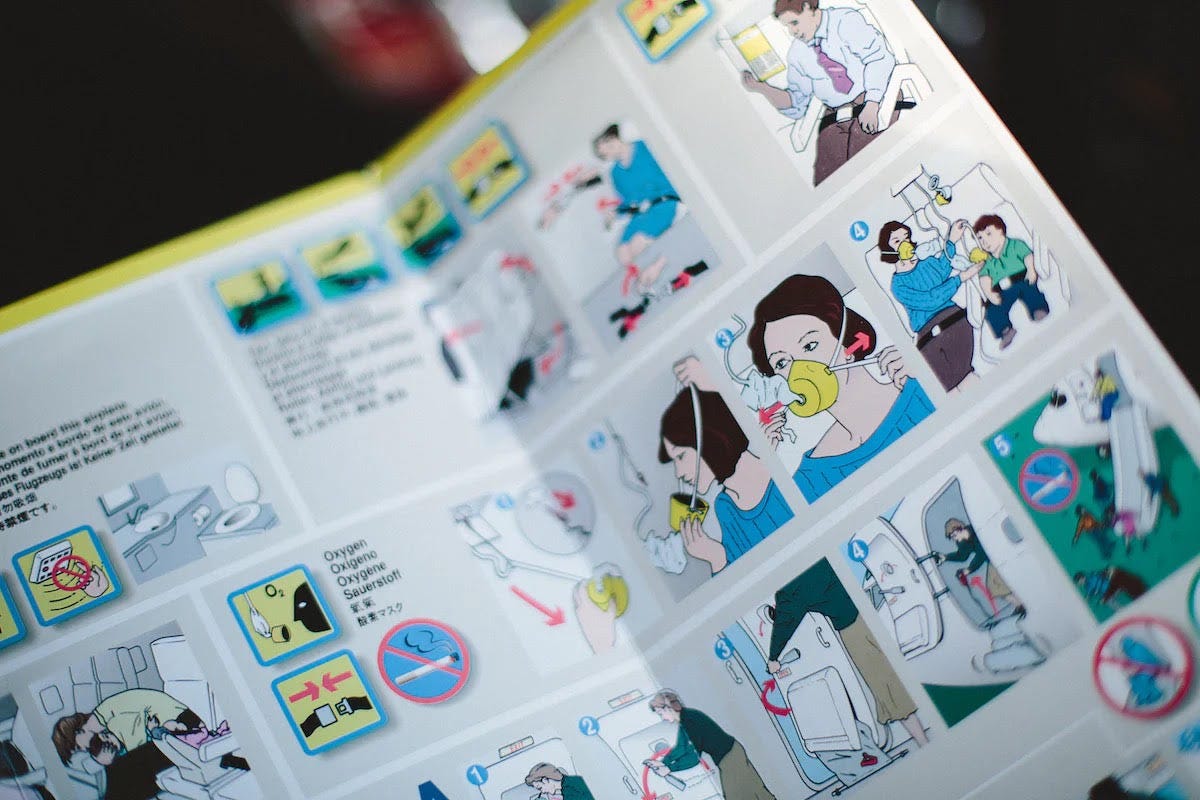Be Selfish to Be Selfless
On Putting your Oxygen Mask on First
Success is survival. —Leonard Cohen
Luck is not chance—
It's Toil—
Fortune's expensive smile
Is earned—
—Emily Dickinson
Above: Instructions for hurtling through the air, whether at 30,000 feet or sea level.
“Buckle up.”
“Drive carefully.”
“Please stand clear of the closing doors.”
“Keep your hands and feet inside the vehicle at all times.”
These are among the many instructions so often heard and so seldom heeded.
In fact, if you are present—truly present—you realize how many things are said and how few are heard, how perception does not mean presence, but that’s another topic for another time.
Most safety warnings’ simplicity belies their importance; these short sentences are worth their weight in wisdom given how many lives and limbs they have preserved.
On a recent flight, I put down my dogeared book, popped my AirPods back in their snug plastic case, and actually listened to the pre-flight safety briefing.
Of all the rigamarole, one bit stayed with me: “Put your own oxygen mask on first, before attempting to help those around you.”
Self-preservation aside, I wondered why these precious few seconds mattered.
Shouldn’t a mother first help her young daughter (or older daughter, her elderly mother) when the oxygen masks dropped?
Why this selfish order of operations?
I asked and the internet answered. In a sentence, hypoxia is a very efficient killer:
Between 30-180 seconds of oxygen deprivation, you may lose consciousness.
At the one-minute mark, brain cells begin dying.
At three minutes, neurons suffer more extensive damage, and lasting brain damage becomes more likely.
At five minutes, death becomes imminent.
At 10 minutes, even if the brain remains alive, a coma and lasting brain damage are almost inevitable.
At 15 minutes, survival becomes nearly impossible.
Delay is literally deadly. The below video shows how and why.
Though worth a watch in full, in the end, someone else has to put the subject’s mask on for him because his brain was incapable of making the decision to save his own life.
Though the gurus, therapists, and self-care ilk have bludgeoned the “put on your oxygen mask first” metaphor to banality, near-all of the most essential truisms—like safety instructions—are at best trite and at worst clichéd.
That they are simple does not mean they are easy.
That they are redundant does not mean they are unimportant.
The Golden Rule works well on any day that ends in y.
When watching the above, something my late grandfather used to say came to mind: “Your only security in life is yourself.”
As it does, my frenetic brain then leapt to lyrics from the Wolfetones’ wonderful Irish ballad “Paddle Your Own Canoe.”
…I've travelled about a bit in me time, of troubles I've seen a few
I found it far better in every clime to paddle me own canoe
Me wants they are small I care not at all, me debts they are paid when due
I drive away strife from the ocean of life and paddle me own canoe
…It's all very well to depend on a friend, that is if you proved him true
You'll find it better by far in the end to paddle your own canoe
To borrow is dearer by far than to buy, a saying though old still true
You never will sigh if you only will try to paddle your own canoe
… So love everybody, trust only the few as the world I go travelling through
And never sit down with a tear and a frown, but paddle your own canoe
I rise with the lark from daylight to dark, I do what I have to do
I'm careless in wealth, I've only me health to paddle me own canoe
Consider the hypoxic man an unlikely teacher:
If you don’t know who you are, how can you become who you’re meant to be?
If you don’t know where you are, how can you get to where you need to go?
Individual excellence is next to godliness and, what’s more, it leads to communal prosperity. When you are at your best, one of two things happens:
You—knowingly or not—help others get to theirs.
You give others permission to do the same.
You never know when breath becomes air, when your output becomes the input that changes someone’s life.
Dostoevsky said it best: “Live and live well; you'll be needed by somebody someday.”
For now, just sit back, relax, and enjoy the journey.
And don’t forget to breathe.
Per my about page, White Noise is a work of experimentation. I view it as a sort of thinking aloud, a stress testing of my nascent ideas. Through it, I hope to sharpen my opinions against the whetstone of other people’s feedback, commentary, and input.
If you want to discuss any of the ideas or musings mentioned above or have any books, papers, or links that you think would be interesting to share on a future edition of White Noise, please reach out to me by replying to this email or following me on Twitter X.
With sincere gratitude,
Tom



